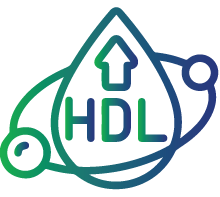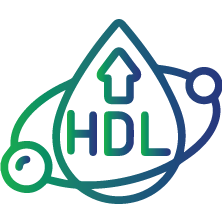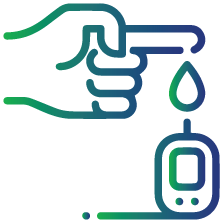
HDL Cholesterol, Direct Test
HDL Cholesterol, Direct Test
A high-density lipoprotein or HDL test measures the level of HDL in your blood. HDL is known as good cholesterol, which means higher levels of HDL in your body are an indication that you are less likely to have cardiovascular diseases. An HDL test is normally performed as part of the lipid profile test. Healthcare providers use this test to screen your risk of developing cardiovascular diseases, such as narrowed or blocked blood vessels (atherosclerosis), heart attack, or stroke.
Low-density lipoprotein (LDL), also called bad cholesterol, is in complete contrast with HDL. This is due to the fact that HDL transports cholesterol to the liver, where it is eliminated from the bloodstream before it deposits in the arteries. LDL, on the other hand, transports cholesterol directly to your arteries. Therefore, it is essential to maintain high HDL levels and low LDL levels in order to stay healthy.
HDL Cholesterol testing is also known as HDL-C Test, Good Cholesterol Test, High-Density Lipoprotein Test, High-Density Lipoprotein Cholesterol Test.
HDL has role in transportation of fatty acids from tissues to the liver and in esterification of PUFA (poly-unsaturated fatty acids). It also helps in the regulation of glucose metabolism and prevents formation of thrombus in the heart (blood clots).
HDL Cholesterol, Direct test is done to determine the level of high-density lipoprotein in your body. Low levels of HDL are an indication of heart disease. Thus, getting your HDL test done is recommended to prevent cholesterol-related heart diseases
What is an HDL test used for?
HDL cholesterol, direct test is used to determine:

Cholesterol risk

Risk of heart disease

Treatment response

Diagnose other diseases
Who should get tested?
An HDL test is recommended to be performed frequently in adults who have risk factors for heart disease. Even for adults with no risk factors, this test is recommended every four to six years. Examples of risk factors include

Age over 45 years for men and 50-55 years for women

High cholesterol on a prior test

Past history of heart disease

Family history of high cholesterol or heart disease

Being overweight or obese

Smoking cigarettes

Alcohol consumption

Having high blood pressure (hypertension)

Having diabetes or prediabetes

Eating an unhealthy diet

Inactive lifestyle
Test preparation:
Fasting for 10 to 12 hours is required before taking the HDL test. During this time, only water can be consumed. The patient is advised to not drink any beverages in the morning, such as tea, coffee, or milk, until the sample collection is completed. Make sure to follow specific instructions provided by your healthcare professional before the test.
Interpretation of results
HDL cholesterol - Interpretation of results in milligrams per litre
|
Range of HDL levels |
Inference |
|
>60 mg/L |
Optimal |
|
40-60 mg/L |
Intermediate |
|
<40 mg/L |
High |
Deviation from normal levels indicates the following:
· Having lower-than-normal levels of HDL can increase your risk of cardiovascular diseases.
· Having higher-than-normal levels of HDL can decrease your risk of cardiovascular diseases.
· Having higher-than-normal levels of total cholesterol, LDL, and triglycerides can increase your risk of cardiovascular diseases.
FAQs
What is the significance of HDL testing?
The HDL test determines the level of HDL that is produced in your body. The screening, monitoring, diagnosis, and follow-up of heart diseases as well as other medical conditions can all be done with an HDL blood test
How HDL test is performed?
During this blood test, a healthcare professional will take a small amount of blood from a vein in your arm using a small needle, which is collected in a test tube or vial. This usually takes less than a few minutes
What are the risks associated with the HDL test?
There are no known risks. During a blood test, one may experience minor pain or bruising where the needle was inserted, but most symptoms will subside quickly
What is the turnaround time (TAT) for the results of an HDL test?
Test results for an HDL test are usually available within 24 hours. However, it could take longer at times
What factors might affect my HDL test result?
Certain lifestyle conditions, such as excess body mass, lean mass, fat percentage, use of contraceptive medications, alcohol consumption, and smoking, may affect HDL values. Other than these, certain disease conditions and stress can also vary the accuracy of the result

